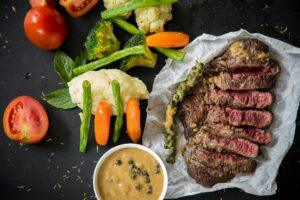Stay full while eating fewer calories—without cutting nutrition. This comprehensive guide covers science, strategy, 14 quick recipes, daily meal examples, and a complete 7‑day plan.Volumetrics
High Fiber
Budget Friendly
Beginner Safe
Principles: Why Low‑Calorie Filling Foods Work
Low energy density + high satiety is the secret. Foods with plenty of water and fiber add volume and stretch your stomach, sending fullness signals at fewer calories. When you anchor meals to vegetables, fruits, legumes, lean proteins, and whole grains, you can eat larger-looking plates that digest slowly, curb cravings, and stabilize energy.
Energy Density 101
- Very low: soups, salads, non‑starchy veg, most fruits
- Low: beans, whole grains, soy yogurt, lean proteins
- Medium: wholegrain breads, starchy veg
- High: oils, fried foods, pastries, candy
Satiety Drivers
- Fiber (veg, legumes, oats)
- Protein (tofu, beans, fish/eggs if not vegan)
- Water volume (soups, stews, fruit)
- Texture + chewing time (crunchy veg, whole fruit)
Plate Formula
50% watery veg + 25% lean protein + 25% slow carbs + 1–2 tsp added fat.
Safety First: How to Do It Responsibly
Target intake: Choose a calorie range that fits your size, activity, and goals. Many people do well at 1400–1900 kcal/day for weight loss. Avoid going below 1200 kcal for women and 1500 kcal for men unless supervised.
- Protein floor: Aim for 1.2–1.6 g/kg bodyweight/day to protect muscle. Spread across meals.
- Fiber goal: 25–38 g/day. Increase gradually to avoid GI discomfort; hydrate well.
- Micronutrients: Include leafy greens, colorful veg, fruit, legumes, fortified milks/yogurts, and whole grains. Consider B12, D, iodine as needed.
- Hydration: 6–10 cups fluids/day (water, unsweetened tea, broth‑based soups).
- Red flags: dizziness, fatigue, hair loss, menstrual changes, or obsessive tracking—raise calories and seek professional support.
Best Foods by Category (Plug‑and‑Play)
Watery Veg
Cucumber, lettuce, spinach, tomatoes, zucchini, mushrooms, broccoli, cauliflower, cabbage.
Roast or air‑fry for flavor at minimal calories.
Lean/Plant Protein
Tofu, tempeh, lentils, beans, soy yogurt, edamame, seitan; (or fish/eggs if flexitarian).
Slow Carbs
Oats, quinoa, barley, potatoes, sweet potatoes, wholegrain pasta, brown rice.
Fruits
Apples, oranges, berries, melon, kiwi—high water and fiber, very filling.
Low‑Cal Flavor
Salsa, vinegar, mustard, lemon, herbs, spices, hot sauce, broth.
Smart Fats
Avocado, nuts, seeds, olive oil—measure carefully: 1–2 tsp goes far.
Core Strategies to Stay Full on Fewer Calories
- Front‑load volume: Start lunch/dinner with a broth soup or big salad.
- Protein at every meal: 20–35 g per main; 10–20 g snacks.
- Fiber everywhere: Add veg to omelets, oats, sandwiches, pasta, bowls.
- Swap density: Replace oil‑heavy sauces with yogurt‑style dips, salsa, vinegar, mustard.
- Use the 20‑minute rule: Eat slowly, then wait before seconds.
- Batch + pre‑portion: Keep grab‑and‑go meals to prevent impulsive eating.
- Plan treats: 10–15% calories for “fun foods” to stay consistent.
Daily Meal Examples (1200–1800 kcal)
Approx. 1400 kcal Day
- Breakfast: Greek‑style soy yogurt, berries, 20 g granola
- Snack: Apple + 1 tsp peanut butter
- Lunch: Big veggie soup + lentil salad
- Snack: Carrots + hummus (2 tbsp)
- Dinner: Tofu stir‑fry over cauliflower‑rice + 1/2 cup brown rice
Approx. 1600 kcal Day
- Breakfast: Oatmeal with soy milk, chia, blueberries
- Snack: Orange + 10 almonds
- Lunch: Chickpea veggie bowl with salsa‑lime dressing
- Snack: Protein smoothie (200 kcal)
- Dinner: Lentil bolognese over zoodles + small pasta
Approx. 1800 kcal Day
- Breakfast: Tofu scramble + toast + tomatoes
- Snack: Soy yogurt + kiwi
- Lunch: Seitan fajita salad with beans and corn
- Snack: Air‑popped popcorn (3 cups)
- Dinner: Red lentil curry + roasted cauliflower + 3/4 cup rice
14 Filling, Low‑Calorie Recipes
Most take 10–25 minutes, emphasize high volume, fiber, and 20–35 g protein per serving. Calories are estimates—adjust portions to your needs.
1) Broth‑Boosted Vegetable & Lentil Soup
~310 kcal | ~22 g protein | 12 g fiber
Ingredients
- 1 cup cooked brown lentils
- 3 cups low‑sodium vegetable broth
- 2 cups mixed vegetables (carrot, celery, zucchini)
- 1 cup chopped tomatoes
- Herbs, pepper, lemon
Directions
- Simmer veg in broth 10–12 min; add lentils and tomatoes.
- Season with herbs and lemon. Serve large bowl.
Start meals with this to reduce overall calories without hunger.
2) High‑Volume Berry Chia Oats
~360 kcal | ~20 g protein | 14 g fiber
Ingredients
- 1/2 cup rolled oats + 1 tbsp chia
- 1 cup soy milk + 1/2 cup water
- 1 scoop vegan protein (vanilla or plain)
- 1 cup frozen berries
- Cinnamon, vanilla
Directions
- Cook oats with milk + water; stir in chia.
- Fold in berries and protein; add water to desired volume.
3) Zesty Chickpea Salad Bowl
~420 kcal | ~23 g protein | 16 g fiber
Ingredients
- 2 cups chopped romaine + cucumber + tomato
- 1 cup chickpeas (rinsed)
- 1/2 cup corn + 1/2 cup diced peppers
- 2 tbsp yogurt‑style dressing (soy) + lime
Directions
- Toss everything with dressing and lime; huge serving volume.
4) Cauliflower‑Rice Tofu Stir‑Fry
~440 kcal | ~32 g protein | 10 g fiber
Ingredients
- 250 g extra‑firm tofu, cubed
- 2 cups cauliflower rice + 1 cup mixed veg
- 2 tbsp soy‑ginger sauce (light)
- 1 tsp sesame oil (optional)
Directions
- Pan‑sear tofu; remove. Stir‑fry veg and cauliflower‑rice 5–6 min.
- Return tofu; toss with sauce; finish with sesame oil.
5) Tomato‑Garlic Zoodles with Lentil Bolognese
~390 kcal | ~24 g protein | 13 g fiber
Ingredients
- 2 cups zucchini noodles
- 1 cup jarred tomato sauce
- 3/4 cup cooked lentils
- Garlic, chili, basil
Directions
- Warm sauce with lentils and garlic. Toss with quick‑sautéed zoodles.
6) Creamy Mushroom Barley Bowl
~470 kcal | ~22 g protein | 12 g fiber
Ingredients
- 1 cup cooked pearl barley
- 2 cups mushrooms + spinach
- 1/2 cup soy yogurt + lemon + pepper
- 1 tsp olive oil
Directions
- Sauté mushrooms; add spinach. Stir in barley and yogurt‑lemon.
7) Big Breakfast Veg Scramble
~380 kcal | ~30 g protein | 9 g fiber
Ingredients
- 220 g tofu, crumbled
- 2 cups mixed veg (peppers, onions, tomatoes)
- 1 tbsp nutritional yeast, turmeric, pepper
- Fresh herbs + salsa
Directions
- Sauté veg; add tofu and seasonings; cook until golden. Top with salsa.
8) Spicy Bean & Veg Soup (5‑Ingredient)
~330 kcal | ~21 g protein | 14 g fiber
Ingredients
- 1 can black beans (rinsed)
- 3 cups low‑sodium broth
- 2 cups frozen mixed veg
- 1 cup canned tomatoes
- Chili powder, cumin
Directions
- Simmer all 12–15 min; season to taste; serve huge bowl.
9) Crunchy Slaw & Edamame Bowl
~410 kcal | ~28 g protein | 12 g fiber
Ingredients
- 3 cups shredded cabbage/carrots
- 1 cup shelled edamame (thawed)
- 1/2 cup corn, scallions
- 2 tbsp rice vinegar + 1 tsp soy + 1 tsp maple
Directions
- Toss everything; let sit 5 minutes to soften; massive volume.
10) Roasted Cauliflower Tacos
~420 kcal | ~22 g protein | 11 g fiber
Ingredients
- 3 cups cauliflower florets + taco seasoning
- 4 small corn tortillas
- 1/2 cup black beans
- Salsa + lime + cilantro
Directions
- Roast cauliflower 18–20 min at 220°C. Fill tortillas with beans + salsa.
11) Citrus‑Herb Quinoa Salad
~430 kcal | ~18 g protein | 10 g fiber
Ingredients
- 1 cup cooked quinoa (cooled)
- 2 cups chopped cucumber, tomato, parsley
- Lemon juice, zest, mint, pepper
- 1 tsp olive oil
Directions
- Toss everything; chill. Add extra veg for more volume.
12) Light Peanut‑Lime Noodles (Shirataki + Veg)
~370 kcal | ~22 g protein | 11 g fiber
Ingredients
- 1 pack shirataki noodles (rinsed well)
- 2 cups stir‑fry veg + 1 cup mushrooms
- 1 tbsp powdered PB + 1 tsp peanut butter
- 1 tbsp soy + lime + chili
- 150 g baked tofu, sliced
Directions
- Dry‑fry noodles 2–3 min. Stir‑fry veg; add tofu and sauce; toss noodles.
13) Apple Pie Protein Smoothie
~280 kcal | ~25 g protein | 8 g fiber
Ingredients
- 1 scoop vanilla vegan protein
- 1 small apple + 1/2 frozen banana
- 1 tbsp flaxseed + cinnamon
- 1 cup soy milk + ice + water to volume
Directions
- Blend until very thick; add water for extra volume.
14) Giant Rainbow Salad with Hummus Dressing
~450 kcal | ~22 g protein | 16 g fiber
Ingredients
- 4 cups mixed greens + tomatoes + cucumbers + peppers
- 3/4 cup chickpeas + 150 g baked tofu
- 2 tbsp hummus + lemon + water + pepper (thinned)
- Fresh herbs
Directions
- Whisk hummus with lemon and water. Toss into a giant bowl of veg + proteins.
Complete 7‑Day Meal Plan
Designed for satiety and sustainability. Portion sizes can be adjusted to fit 1400–1900 kcal/day. Double dinner to create next‑day lunch when useful.
| Day | Breakfast | Lunch | Dinner | Snack (100–250 kcal) |
|---|---|---|---|---|
| Mon | Berry Chia Oats | Chickpea Salad Bowl | Cauli‑Rice Tofu Stir‑Fry | Apple Pie Smoothie |
| Tue | Veg Scramble | Citrus‑Herb Quinoa Salad | Vegetable & Lentil Soup + side salad | Popcorn (3 cups) + soy yogurt |
| Wed | Soy yogurt + berries + 20 g granola | Giant Rainbow Salad | Zoodles Lentil Bolognese | Apple + peanut butter (1 tsp) |
| Thu | Berry Chia Oats | Slaw & Edamame Bowl | Spicy Bean Soup + steamed veg | Protein bar (180–220 kcal) |
| Fri | Apple Pie Smoothie | Leftover soup/salad combo | Roasted Cauliflower Tacos | Orange + 10 almonds |
| Sat | Veg Scramble | Mushroom Barley Bowl | Light Peanut‑Lime Noodles | Carrots + hummus (2 tbsp) |
| Sun | Overnight oats (variation of #2) | Vegetable & Lentil Soup | Cauli‑Rice Stir‑Fry or Zoodles | Soy yogurt + kiwi |
Smart Grocery List (1‑Week)
Produce
- Leafy greens, cabbage/slaw, tomatoes, cucumbers, peppers
- Cauliflower, zucchini, mushrooms, carrots, celery, onions
- Apples, oranges, berries, bananas, lemons/limes
Proteins
- Tofu (4 blocks), tempeh (2), seitan (1–2)
- Canned or cooked lentils, chickpeas, black beans
- Soy/pea protein powder, soy yogurt
Carbs & Grains
- Oats, quinoa, barley, brown rice, wholegrain pasta
- Shirataki noodles (optional)
- Wholegrain bread or small tortillas
Pantry & Flavor
- Low‑sodium broth, canned tomatoes, salsa
- Mustard, vinegar, soy sauce, hot sauce, spices
- Hummus, powdered peanut butter, olive oil (measure!)
FAQ, Swaps & Storage
How do I avoid hunger on lower calories?
Front‑load meals with soups/salads, include 25–35 g protein per main, add fruit/veg to snacks, and drink water or unsweetened tea between meals.
Can I follow this while busy?
Yes—batch soup, roast vegetables, cook a grain + tofu once, and assemble bowls/wraps in minutes all week.
Gluten‑free?
Use GF oats, pasta, and wraps; rely on potatoes, rice, quinoa; skip seitan.
How long do meals keep?
- Soups/chili: 4–5 days refrigerated, 2–3 months frozen
- Cooked grains/legumes: 3–4 days
- Pre‑chopped veg: 2–3 days
- Dressings: 5–7 days
Success Checklist
- Set a realistic calorie range and protein floor.
- Plan 1–2 batch recipes + 2 no‑cook options each week.
- Keep low‑cal flavor bombs: salsa, vinegar, herbs, mustard.
- Eat slowly; stop at 80–90% full.
- Review progress weekly; adjust portions, not food lists.
Keywords: low calorie filling foods, volumetrics diet, how to feel full on fewer calories, high fiber low calorie meals, low energy density foods, satiating meals for weight loss, low calorie recipes, healthy meal plan, daily meal examples, safe calorie deficit, budget friendly weight loss foods, soup and salad starters, protein packed low calorie, vegan low calorie meals, low calorie high volume ideas




